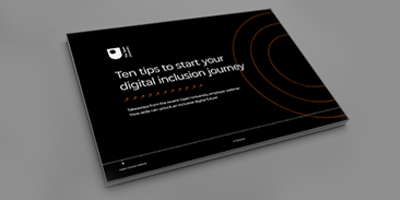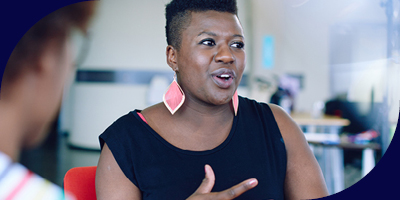You are here
- Home
- Why your business should embrace accessibility and digital inclusion
Why your business should embrace accessibility and digital inclusion

Some organisations still think of accessibility and digital inclusion as niceties, add-ons to its core business operations. But accessibility and digital inclusion are intrinsic to organisational success.
They are key to being a modern, forward-thinking business, to being a diverse, inclusive and successful organisation. Employers that realise that, incorporating accessibility and digital inclusion into every aspect of business operations and embedding them into the organisational culture at every level, really reap the benefits.
Improved products and services, enhanced performance, productivity, innovation, recruitment, retention, reputation, employee motivation and loyalty – there’s a long list of business-critical benefits achieved through accessibility and digital inclusion.
Something else that a lot of employers do is to bundle accessibility and digital inclusion together, viewing them as one thing. They are not. They are very much interlinked and it’s impossible to have one without the other.
Organisations need to be mindful of the interchangeable use of the terms digital accessibility and digital inclusion.
Digital accessibility is about ensuring disabled people can successfully access and use digital products and services, whereas digital inclusion has a wider scope, such as addressing digital poverty.
Laila Burton
Senior Manager, Office of the Pro-Vice-Chancellor (Students), The Open University
Digital inclusion
Digital inclusion means ensuring that everyone has access to the Internet and digital technologies and the skills to use them effectively. People suffering digital poverty either live without or have minimal access to digital products and services. According to the Digital Poverty Alliance, digital poverty is “the inability to interact with the online world fully, when, where and how an individual needs to”.
The number of people living in digital poverty was really exposed during the Covid-19 pandemic, with those who lacked sufficient connectivity, devices and/or skills to work and learn from home being severely disadvantaged. With the current cost of living crisis, digital poverty is worsening. For example, up to one million people cancelled their broadband in the last year because of the cost of living crisis, according to figures from the charity Citizens Advice.
And as Laila points out, people with disabilities are disproportionally affected by digital poverty. “People with disabilities are far more likely to be digitally excluded, putting them at a double disadvantage. Our research at The Open University (OU) has also shown that students who are Black or Asian, or from a lower socio-economic background were also more likely to experience digital exclusion during the pandemic, which supports the findings of research by Jisc. Even though we have now emerged from the pandemic, many students are still experiencing digital exclusion and at the OU we want to raise students’ awareness of the support that is available. However, as we have emerged from the pandemic, the sharing of workspace and devices is perhaps less prevalent than it was during lockdowns.”
The OU is passionate about designing curriculum that is as inclusive as possible and the University has a diverse team of curriculum student consultants who have lived experience, who are championing related issues such as accessibility and helping colleagues embed inclusive learning design. “Co-creation is so important,” explains Laila.
Go deeper: The economic impact of digital inclusion in the UK – The Good Things Foundation
Accessibility
According to Ciaragh Hubert, Director of Accessibility at the OU, accessibility is about removing barriers.
It’s about designing our systems, information, activities and environments to be easy to use and engage with for as many people as possible. It involves removing barriers, for people with disabilities and long-term health conditions, providing adjustments, innovating and adopting a human-centred approach into everything we do.
Timing is important too when it comes to embedding accessibility into processes and ways of working.
Ciaragh Hubert
Director of Accessibility, The Open University
Jade Matos Carew, Head of Digital Accessibility and Usability at the OU suggests that “it’s so important to consider digital accessibility right at the beginning, from the planning and design stages. Trying to retrofit it later on is trickier to do, and more expensive.”
Ciaragh is clear that employers need to move beyond the idea that accessibility is a ‘nice thing to do’ and understand that it’s good for business, as well as good for individuals. There is a strong business case for accessibility, not just a moral imperative. “It’s the socially right thing to do. It’s the legal thing to do. It’s also the commercial thing to do. There are massive business benefits to accessibility.”
Making the case to employers
The OU recently hosted an Employer webinar called How skills can unlock an inclusive digital future, bringing together a panel of experts to share their thoughts and experiences. One theme that emerged very strongly in the webinar is that organisations need to widen their thinking around digital inclusion and accessibility – everyone benefits from more accessible products and services, from large text on phones and subtitles on films to web pages written in clear and plain English.

In this mobile first world which we’re undoubtedly in, I would argue that accessibility or digital inclusion is not just for disabled people because every single person using a mobile phone on a daily basis is extreme computing.
You’re juggling your phone one handed, or it’s a small sheet of shiny glass on a sunny day, or it’s a bumpy bus or a noisy café. Microsoft have done some brilliant awareness raising about this idea of situational impairments. If you’re going to take one thing away from today, it’s that digital accessibility is going to benefit every single user every day. But for me, as a disabled person, as a blind person, the technology has meant that I am able to do my job. I’m able to be in work.
Robin Christopherson
Head of Digital Inclusion, AbilityNet
Ciaragh couldn’t agree more. She says creating products and services through the lens of accessibility and digital inclusion results in a better experience for everyone. “Accessibility improves everyone’s life.”
The importance of diversity and skills in the workplace
Culture is key to being an accessible and inclusive employer. Employers need to understand the value of accessibility and inclusivity and embed them throughout their organisation. They also need to foster a culture of learning, enabling all employees from a diverse range of backgrounds, to continuously upskill and reskill. Skills gaps continue to bite, with employers struggling to recruit and retain the talent they need to drive positive change.
The prevalence of basic digital skills in society is one issue to resolve that impacts workforces. The Good Things Foundation has highlighted that 10 million people lack basic digital skills and this will impact the workplace (as well as heighten the need for digitally inclusive products and services as previously discussed). Education in the workplace can help to bring digitally excluded groups back into work and make a contribution.
The OU’s Business Barometer 2023 report, which has just been released, found that almost three quarters of UK organisations (73%) are experiencing skills shortages, with over half (54%) saying they don’t have any specific initiatives, skills programmes or workplace adjustments in place for specific talent pools, including underrepresented groups such as people with disabilities or workers from diverse ethnicities. The webinar, How skills can unlock an inclusive digital future, demonstrated the value of diverse experience and thinking within teams but employers need to open doors to all talent pools.
Jane Dickinson, Digital Skills Lead at the OU, who was on the webinar panel, said organisations need to develop a learning culture, particularly around digital. They need to help employees at all levels build their digital confidence and capability, whether it’s basic digital literacy or cutting-edge digital skills. “It’s about building confidence, helping people move into new jobs and creating mobility within the workforce,” she says.
Watch the webinar: How skills can unlock an inclusive digital future
If you would like to discuss how the OU can help develop your workforce, please contact us.
You might also like...
Find out how we can help your organisation
Please contact us to speak to one of our business team advisors.
Not on our mailing list?
Sign up to receive regular emails that are full of advice and resources to support staff development in your organisation.


